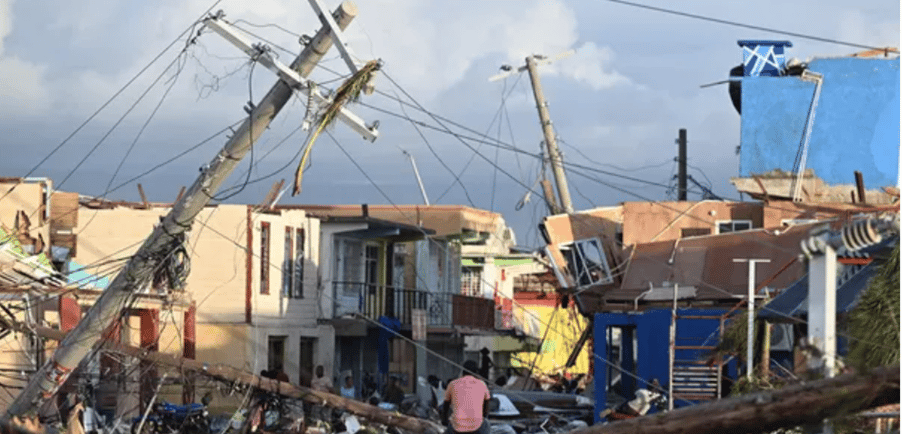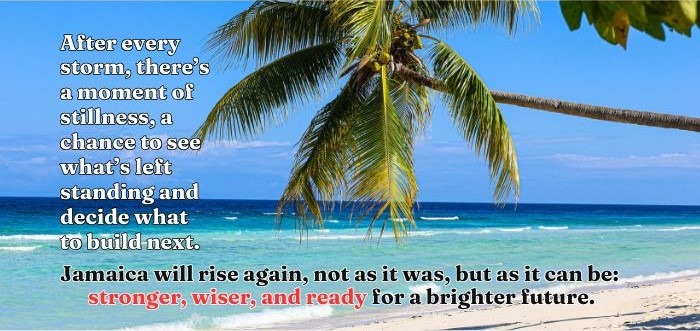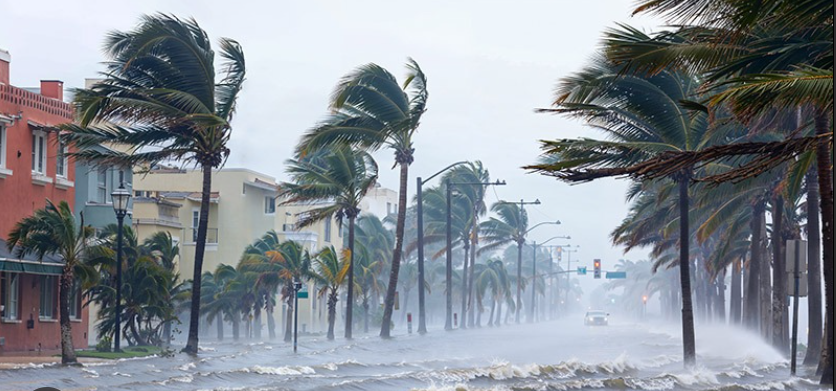After a Storm...
How Hurricane Melissa Can Become a Catalyst for Renewal
Andrea Campbell
11/1/20254 min read


The Devastation
On 28 October 2025, Hurricane Melissa made landfall in Jamaica as a ferocious Category 5 storm, with sustained winds of up to 185 mph. The destruction was widespread: entire buildings were flattened, roofs torn off, power grids collapsed, and communities left underwater. The parish of St. Elizabeth was described as “obliterated” (Wikipedia)
Estimates of the economic impact suggest damage amounting to 28–32% of Jamaica’s GDP, a staggering figure that highlights the massive scale of the disaster (Reuters). Lives have been lost, livelihoods destroyed, and the human toll is beyond measure.
The support of the international community, including individuals and organisations, is particularly needed at this time. Charitable organisations from around the world are providing support to the people of Jamaica. One such organisation is the Camptys Foundation, based in the UK, which focuses on families caring for children with special needs and disabilities. Their work is invaluable, and at this time, more than ever, they deserve your support.
Why This is More Than a Disaster
Though tragic, such events often hold hidden potential for change. While immediate concerns focus on safety and recovery, the long-term benefits can be substantial. Author Caroline Hurry, in her book “Worm Wrangling,” shares the idea of “turning scraps into black gold”. This is more than a metaphor; it’s a mindset. Even amid destruction, there’s opportunity. The debris left by Hurricane Melissa is not just a sign of loss but an invitation to innovate, rebuild, and reposition. Those who recognize value in the fragments will lead Jamaica’s emergence from disaster into a new era of renewal. Let’s explore some of the silver linings that can emerge from this disaster.
1. Infrastructure Renewal with Resilience in Mind
With much of Jamaica’s infrastructure damaged or destroyed, there’s a rare opportunity to rebuild stronger, smarter, and more climate-resilient. For example, it is reported that the government is considering placing electrical lines underground to withstand future storms. This moment presents an opportunity for Jamaica to upgrade outdated systems and invest in improved infrastructure.
2. Energy Innovation & Independence
A key benefit is the increasing focus on solar power and battery storage. According to theenergymix.com, after Melissa, homes with rooftop solar and storage systems continued to operate while the grid collapsed around them. This disaster could accelerate Jamaica’s transition to clean, local, and resilient energy, reducing its reliance on imported fuels and protecting against future outages.
3. Rethinking Land Use & Environmental Protection
The storm revealed the dangers of deforestation, vulnerable terrain, and poorly planned development. AP News reports that landslides and flash flooding were much worse in areas where tree cover had been removed. Jamaica now has the chance to strengthen its environmental policies, prioritize natural buffers, restore forests, and build in harmony with nature rather than against it. This not only reduces risks but also enhances long-term ecological value.
4. Innovation in Community Leadership & Social Enterprise
Disasters push communities to act quickly. As traditional infrastructure collapsed, many Jamaicans stepped up, innovated, and adapted. That spirit of innovation can be directed toward new businesses, community networks, and social enterprises. This is a time for creative thinking and problem-solving. Creative thinking specialist Andrea Campbell (andreacampbell.co.uk) says it like this: “If you can’t find what you want on the outside, go back and look on the inside.” Although we need to reach out and connect with others, there comes a moment when we must look inward, reflect, strategize, and build. In times of crisis, new ideas often emerge, creating opportunities for entrepreneurial growth, local empowerment, and social innovation.
5. A Branding Opportunity for Change
Jamaica can gain a strategic advantage by rebuilding intentionally: enhancing its global image, attracting diverse investments, and showing leadership in resilience. Organizations, including consultancies and firms that specialize in strategic positioning, can contribute to this effort. For instance, if you focus on premium positioning in consulting or management, you may find that rebuilding narratives becomes a valuable strategic asset. Veteran business consultant David White (DavidWhiteConsulting.com) offers the kind of strategic thinking and positioning essential in these times, helping leaders and organizations turn crises into opportunities.
How You Can Engage
Storms reveal weaknesses, but they also highlight what truly matters. In business and leadership, the ability to respond to and adapt after disruption is crucial for achieving long-term success.
For business leaders and organizational heads: Use this moment to re-evaluate your organizational strategy, values, and purpose. Are you simply rebuilding what was, or reinventing for what could be?
For community leaders and change-makers: Mobilise local energy and innovation. Consider the small businesses or social enterprises that can be built, and how you can leverage current competencies for the moment of change
For investors and policymakers: Prioritise resilience, sustainability, and human-centred design. The next generation of infrastructure must serve both people and the planet.
For individuals: Recognise that loss often precedes growth. In the ruins, there lies opportunity for skill-building, solving new problems, and making a meaningful difference.
Final Thoughts
Hurricane Melissa devastated lives and landscapes in Jamaica. There is no denying the extent of the loss. But “like a phoenix rising from the ashes,” Jamaica too will recover. The ashes represent not just destruction, but also a blank canvas, and the island now has a rare window of opportunity to rebuild stronger, cleaner, and more innovatively.
The call to action is clear: Don’t rebuild just what was, rebuild what will be. The time is now to unlock the potential that the disaster has laid bare; to move from tragedy to transformation. And for any organisation or leader looking to claim the premium position in this next phase, this is a time to raise the bar, not just for recovery, but for leadership in a changed world.




